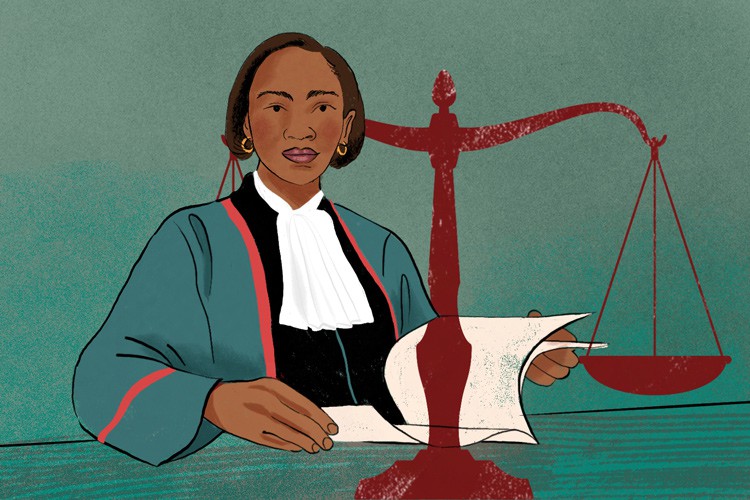Attempt to neuter corruption-busting tribunal rebuffed by Concourt
Appeal brought by company accused of dodgy Covid contracts dismissed
The Special Tribunal can continue its work, the Constitutional Court ruled on Friday. Graphic: Lisa Nelson
- The Constitutional Court has ruled that the Special Tribunal has the power to adjudicate on and set aside unlawful procurement contracts.
- The appeal was brought by Ledla Structural Development, which the tribunal found had been irregularly awarded Covid contracts.
- The court said while the tribunal was not a court, the provisions of the Special Investigations Unit Act gave it broad remedial powers to conduct legality reviews in civil proceedings.
While the Special Tribunal was not a “court”, it can adjudicate on, and set aside unlawful procurement contracts, the Constitutional Court has ruled.
“It is clear that the legislative intention was to cast a wide net over the scope of proceedings the Special Tribunal is empowered to adjudicate upon. Therefore a legality review is not excluded from the ambit of its jurisdiction,” said Justice Nonkosi Mhlantla, writing for the unanimous court, in her ruling on Friday.
The judgment means that the tribunal can continue with its work and can set aside government contracts it finds were awarded unlawfully or through corruption, and that its previous decisions stand. The Special Tribunal hears corruption cases brought by the Special Investigating Unit, including those involving Lottery money.
The issue of whether or not the Special Tribunal has the power to grant forfeiture orders was also before the court. Justice Mhlantla said this constitutional challenge had not been properly formulated and the Minister of Justice had not been joined to the proceedings. Therefore the court could not deal with this issue.
The appeal before the court was brought by Ledla Structural Development which was awarded a PPE contract by the Gauteng Department of Health during the height of the Covid pandemic. The Special Tribunal ruled that the award was unlawful and tainted by corruption.
The tribunal found that the contract had been irregularly awarded to Ledla, which was a “proxy” for Royal Bhaca Projects, a company owned by Madzikane Thandisizwe Diko, the husband of presidential spokesperson Khusela Diko and a relative of Gauteng’s then MEC for Health Dr Bandile Masuku. It also granted a forfeiture order of more than R38-million, being the proceeds of the “crime”.
The appeal by Ledla - which argued that the tribunal was merely an administrative agency, not a court, and had no powers of review or forfeiture - had the potential to strip the powers of the Special Tribunal. But South Africa’s apex court has dismissed their appeal.
Justice Mhlantla said the matter concerned an inquiry into the exercise of public power, and the court had been called upon to provide clarity on the competence of the tribunal and its powers.
“These questions have greater implications, not just for the litigants but also for other parties who may find themselves before the Special Tribunal in similar cases.”
The judge said the tribunal was not a court, but a creature of statute.
However, the provisions of the Special Investigations Unit Act gave it broad remedial powers to conduct legality reviews in civil proceedings.
“The preamble to the act makes it abundantly clear that the Act has its objective, amongst other, the establishment of structures, including the Special Tribunal, to address the rampant corruption, in all forms of malfeasance, in our country.
The judge wrote that the tribunal has the jurisdiction to adjudicate reviews brought by the Special Investigating Unit (SIU) and to grant an order setting aside an unlawful procurement contract.
Support independent journalism
Donate using Payfast

Don't miss out on the latest news
We respect your privacy, and promise we won't spam you.
Next: Pregnant learners can only attend school if accompanied by a parent
Previous: R6-million spent on water project but no diesel to run the pump
© 2023 GroundUp. This article is licensed under a Creative Commons Attribution-NoDerivatives 4.0 International License.
You may republish this article, so long as you credit the authors and GroundUp, and do not change the text. Please include a link back to the original article.
We put an invisible pixel in the article so that we can count traffic to republishers. All analytics tools are solely on our servers. We do not give our logs to any third party. Logs are deleted after two weeks. We do not use any IP address identifying information except to count regional traffic. We are solely interested in counting hits, not tracking users. If you republish, please do not delete the invisible pixel.

